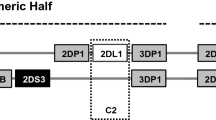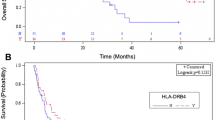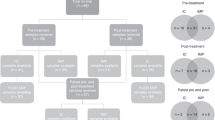Abstract
Antibody-dependent cellular cytotoxicity (ADCC), which is activated by effector cells via immunoglobulin G (IgG) fragment C receptors (FcRs), was proposed as a mechanism of cetuximab efficacy. Peripheral blood mononuclear cells (PBMCs) from 23 healthy donors and 13 patients with metastatic colorectal cancer (mCRC) treated with cetuximab were tested for FcγR polymorphisms and cetuximab-mediated ADCC. ADCC was measured by chromium-51 release on a epidermal growth factor receptor (EGFR)-positive human colon cancer cell line. Overall, 86 mCRC patients were genotyped for study purposes. PBMCs harbouring the FcγRIIIa 158 V/V genotype had a significantly higher cetuximab-mediated ADCC. No correlation was found between FcγR polymorphisms and response rate or time to progression after cetuximab-based therapy. Despite the in vitro analysis showing that the FcγRIIIa 158 V/V genotype is associated with higher ADCC, clinical data do not support a predictive role of FcγRIIIa polymorphisms in mCRC treated with cetuximab.
This is a preview of subscription content, access via your institution
Access options
Subscribe to this journal
Receive 6 print issues and online access
$259.00 per year
only $43.17 per issue
Buy this article
- Purchase on Springer Link
- Instant access to full article PDF
Prices may be subject to local taxes which are calculated during checkout


Similar content being viewed by others
References
Laskin JJ, Sandler AB . Epidermal growth factor receptor: a promising target in solid tumours. Cancer Treat Rev 2004; 30: 1–17.
Chung KY, Shia J, Kemeny NE, Shah M, Schwartz GK, Tse A et al. Cetuximab shows activity in colorectal cancer patients with tumors that do not express the epidermal growth factor receptor by immunohistochemistry. J Clin Oncol 2005; 23: 1803–1810.
Hecht JR, Mitchell E, Neubauer MA, Burris HA, Swanson P, Lopez T et al. Lack of correlation between epidermal growth factor receptor status and response to panitumumab monotherapy in metastatic colorectal cancer. Clin Cancer Res 2010; 16: 2205–2213.
Iannello A, Ahmad A . Role of antibody-dependent cell-mediated cytotoxicity in the efficacy of therapeutic anti-cancer monoclonal antibodies. Cancer Metastasis Rev 2005; 24: 487–499.
Fanger MW, Shen L, Graziano RF, Guyre PM . Cytotoxicity mediated by human Fc receptors for IgG. Immunol Today 1989; 10: 92–99.
Cartron G, Watier H, Golay J, Solal-Celigny P . From the bench to the bedside: ways to improve rituximab efficacy. Blood 2004; 104: 2635–2642.
Weng WK, Levy R . Two immunoglobulin G fragment C receptor polymorphisms independently predict response to rituximab in patients with follicular lymphoma. J Clin Oncol 2003; 21: 3940–3947.
Cartron G, Dacheux L, Salles G, Solal-Celigny P, Bardos P, Colombat P et al. Therapeutic activity of humanized anti-CD20 monoclonal antibody and polymorphism in IgG Fc receptor FcγRIIIa gene. Blood 2002; 99: 754–758.
Kim DH, Jung HD, Kim JG, Lee JJ, Yang DH, Park YH et al. FcγRIIIa gene polymorphisms may correlate with response to frontline R-CHOP therapy for diffuse large B-cell lymphoma. Blood 2006; 108: 2720–2725.
Musolino A, Naldi N, Bortesi B, Pezzuolo D, Capelletti M, Missale G et al. Immunoglobulin G fragment C receptor polymorphisms and clinical efficacy of trastuzumab-based therapy in patients with HER-2/neu–positive metastatic breast cancer. J Clin Oncol 2008; 26: 1789–1796.
Wu J, Edberg JC, Redecha PB, Bansal V, Guyre PM, Coleman K et al. A novel polymorphism of FcgammaRIIIa (CD16) alters receptor function and predisposes to autoimmune disease. J Clin Invest 1997; 100: 1059–1070.
Shields RL, Namenuk AK, Hong K, Meng YG, Rae J, Briggs J et al. High resolution mapping of the binding site on human IgG1 for Fc gamma RI, Fc gamma RII, Fc gamma RIII, and FcRn and design of IgG1 variants with improved binding to the Fc gamma R. J Biol Chem 2001; 276: 6591–6604.
Binstadt BA, Geha RS, Bonilla F . IgG Fc receptor polymorphisms in human disease: implications for intravenous immunglobulin therapy. J Allergy Clin Immunol 2003; 111: 697–703.
Zhang W, Gordon M, Schultheis AM, Yang DY, Nagashima F, Azuma M et al. FCGR2A and FCGR3A polymorphisms associated with clinical outcome of epidermal growth factor receptor expressing metastatic colorectal cancer patients treated with single-agent cetuximab. J Clin Oncol 2007; 25: 3712–3718.
Bibeau F, Lopez-Crapez E, Di Fiore F, Thezenas S, Ychou M, Blanchard F et al. Impact of Fc{gamma}RIIa-Fc{gamma}RIIIa polymorphisms and KRAS mutations on the clinical outcome of patients with metastatic colorectal cancer treated with cetuximab plus irinotecan. J Clin Oncol 2009; 27: 1122–1129.
Abdullah N, Greenman J, Pimenidou A, Topping KP, Monson JR . The role of monocytes and natural killer cells in mediating antibody-dependent lysis of colorectal tumour cells. Cancer Immunol Immunother 1999; 48: 517–524.
Morgan AW, Barrett JH, Griffiths B, Subramanian D, Robinson JI, Keyte VH et al. Analysis of Fcgamma receptor haplotypes in rheumatoid arthritis: FCGR3A remains a major susceptibility gene at this locus, with an additional contribution from FCGR3B. Arthritis Res Ther 2006; 8: R5.
Koene HR, Kleijer M, Algra J, Roos D, von Dem Borne AE, de Haas M . Fc-gamma-RIIIa-158 V/F polymorphism influences the binding of IgG by natural killer cell Fc-gamma-RIIIa, independently of the Fc-gamma-RIIIa-48 L/R/H phenotype. Blood 1997; 90: 1109–1114.
Norris CF, Pricop L, Millard SS, Taylor SM, Surrey S, Schwartz E et al. A naturally occurring mutation in Fc gamma RIIA: A Q to K127 change confers unique IgG binding properties to the R131 allelic form of the receptor. Blood 1998; 91: 656–662.
Chernoff H, Lehmann EL . The use of maximum likelihood estimates in χ2 tests for goodness-of-fit. Ann Math Stat 1954; 25: 579–586.
Freeman DH . Applied Categorical Data Analysis. Marcel Dekker Inc: New York, 1987.
Kaplan EL, Meier P . Nonparametric estimation from incomplete observations. J Am Stat Assoc 1958; 53: 457–481.
Mantel N . Evaluation of survival data and two new rank order statistics arising in its consideration. Cancer Chemother Rep 1966; 50: 163–170.
Cunningham D, Humblet Y, Siena S, Khayat D, Bleiberg H, Santoro A et al. Cetuximab monotherapy and cetuximab plus irinotecan in irinotecan-refractory metastatic colorectal cancer. N Engl J Med 2004; 351: 337–345.
Jonker DJ, O’Callaghan CJ, Karapetis CS, Zalcberg JR, Tu D, Au HJ et al. Cetuximab for the treatment of colorectal cancer. N Engl J Med 2007; 357: 2040–2048.
Sobrero AF, Maurel J, Fehrenbacher L, Scheithauer W, Abubakr YA, Lutz MP et al. EPIC: Phase III trial of cetuximab plus irinotecan after fluopyrimidine and oxaliplatin failure in patients with metastatic colorectal cancer. J Clin Oncol 2008; 26: 2311–2319.
Van Cutsem E, Kohne CH, Hitre E, Zaluski J, Chang Chien CR, Makhson A et al. Cetuximab and chemotherapy as initial treatment for metastatic colorectal cancer. N Engl J Med 2009; 360: 1408–1417.
Linardou H, Dahabreh IJ, Kanaloupiti D, Siannis F, Bafaloukos D, Kosmidis P et al. Assessment of somatic k-RAS mutations as a mechanism associated with resistance to EGFR-targeted agents: a systematic review and meta-analysis of studies in advanced non-small-cell lung cancer and metastatic colorectal cancer. Lancet Oncol 2008; 9: 962–972.
Pander J, Gelderblom H, Antonini NF, Tol J, van Krieken JH, van der Straaten T et al. Correlation of FCGR3A and EGFR germline polymorphisms with the efficacy of cetuximab in KRAS wild-type metastatic colorectal cancer. Eur J Cancer 2010; 46: 1829–1834.
Graziano F, Ruzzo A, Loupakis F, Canestrari E, Santini D, Catalano V et al. Pharmacogenetic profiling for cetuximab plus irinotecan therapy in patients with refractory advanced colorectal cancer. J Clin Oncol 2008; 26: 1427–1434.
Geva R, Jensen BV, Fountzilas G, Yoshino T, Paez D, Montagut C et al. An international consortium study in chemorefractory metastatic colorectal cancer (mCRC) patients (pts) to assess the impact of FCGR polymorphisms on cetuximab efficacy. J Clin Oncol 2011; 29, (Suppl; abstract 3528).
Dahan L, Norguet E, Etienne-Grimaldi MC, Formento JL, Gasmi M, Nanni I et al. Pharmacogenetic profiling and cetuximab outcome in patients with advanced colorectal cancer. BMC Cancer 2011; 11: 496.
Naramura M, Gillies SD, Mendelsohn J, Reisfeld RA, Mueller BM . Therapeutic potential of chimeric and murine anti-(epidermal growth factor receptor) antibodies in a metastasis model for human melanoma. Cancer Immunol Immunother 1993; 37: 343–349.
Kurai J, Chikumi H, Hashimoto K, Yamaguchi K, Yamasaki A, Sako T et al. Antibody-dependent cellular cytotoxicity mediated by cetuximab against lung cancer cell lines. Clin Cancer Res 2007; 13: 1552–1561.
Lurje G, Nagashima F, Zhang W, Yang D, Chang HM, Gordon MA et al. Polymorphisms in cyclooxygenase-2 and epidermal growth factor receptor are associated with progression-free survival independent of K-ras in metastatic colorectal cancer patients treated with single-agent cetuximab. Clin Cancer Res 2008; 14: 7884–7895.
Gessner JE, Heiken H, Tamm A, Schmidt RE . The IgG Fc receptor family. Ann Hematol 1998; 76: 231–248.
Uchida J, Hamaguchi Y, Oliver JA, Ravetch JV, Poe JC, Haas KM et al. The innate mononuclear phagocyte network depletes B lymphocytes through Fc receptor-dependent mechanisms during anti-CD20 antibody immunotherapy. J Exp Med 2004; 199: 1659–1669.
Weng WK, Czerwinski D, Levy R . Humoral immune response and immunoglobulin G Fc receptor genotype are associated with better clinical outcome following idiotype vaccination in follicular lymphoma patients regardless of their response to induction chemotherapy. Blood 2007; 109: 951–953.
Leibowitz MS, Nayak JV, Ferris RL . Head and neck cancer immunotherapy: clinical evaluation. Curr Oncol Rep 2008; 10: 162–169.
Acknowledgements
This work was supported in part by the Cariparma Foundation (Fondazione Cassa di Risparmio di Parma, Parma, Italy).
Author information
Authors and Affiliations
Corresponding author
Ethics declarations
Competing interests
The authors declare no conflict of interest.
PowerPoint slides
Rights and permissions
About this article
Cite this article
Negri, F., Musolino, A., Naldi, N. et al. Role of immunoglobulin G fragment C receptor polymorphism-mediated antibody-dependant cellular cytotoxicity in colorectal cancer treated with cetuximab therapy. Pharmacogenomics J 14, 14–19 (2014). https://doi.org/10.1038/tpj.2012.54
Received:
Revised:
Accepted:
Published:
Issue Date:
DOI: https://doi.org/10.1038/tpj.2012.54
Keywords
This article is cited by
-
Combination of KIR2DS4 and FcγRIIa polymorphisms predicts the response to cetuximab in KRAS mutant metastatic colorectal cancer
Scientific Reports (2019)
-
Germline polymorphisms as biomarkers of tumor response in colorectal cancer patients treated with anti-EGFR monoclonal antibodies: a systematic review and meta-analysis
The Pharmacogenomics Journal (2017)
-
Immunoglobulin G fragment C receptor polymorphisms and efficacy of preoperative chemotherapy plus trastuzumab and lapatinib in HER2-positive breast cancer
The Pharmacogenomics Journal (2016)
-
FCGR2A and FCGR3A polymorphisms and clinical outcome in metastatic colorectal cancer patients treated with first-line 5-fluorouracil/folinic acid and oxaliplatin +/- cetuximab
BMC Cancer (2014)
-
The contribution of antibodies to targeted cancer therapy
memo - Magazine of European Medical Oncology (2013)



